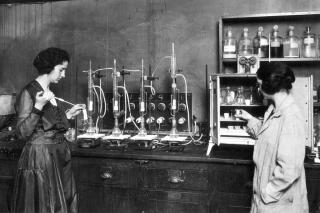As we enter the month of March it is an honor to celebrate Women’s History Month. This is an important moment to recognize the many contributions and achievements of women throughout our history, while also reaffirming our commitment to advancing gender equity and inclusion.
This year is particularly significant as it marks the 125th anniversary of Simmons University – an institution founded for equality and dedicated to furthering social justice and economic mobility. Given this historic moment, I have been reflecting upon the critical role that women’s-centered institutions like Simmons have and continue to play in shaping and influencing our world.
Leadership and activism have long been hallmarks of Simmons University. For the past 125 years, Simmons women have challenged the status quo, broken down barriers, and helped to create a more just world through their learning, scholarship, service, and advocacy. They have also fought to advance a host of issues ranging from women’s suffrage and access to healthcare, to greater representation in industries historically off-limits to women and other under-represented groups.
This includes trailblazing alums like the great civil rights and public health advocate Dorothy Celeste Boulding Ferebee ‘1920, who helped pioneer the way for Black women in medicine – fighting against racism and working to improve access to healthcare in underserved communities. It also includes Bertha Capen Reynolds ‘1914, a social worker who pioneered new theories and methodologies and who was committed to serving marginalized populations.
More recently, I have been thinking about Lenore Blum ’63, a strong advocate for women in STEM. Throughout her career, Blum has advanced diversity in math and computer science with initiatives such as the co-founding of the Association for Women in Mathematics. And then there is Maria Karagianis ’70, a Pulitzer Prize-winning reporter who served as one of the first full-time female staff writers for The Boston Globe – covering major breaking news stories typically reserved for men.
These are just a few examples of Simmons leaders whose talent, passion, and commitment are making our world a better place. Their contributions are a reminder that while Women’s History Month is an opportunity to celebrate the many gains women have made, it is also a time to recommit to the work yet left to do. Women’s-centered institutions like Simmons are well positioned to help address these challenges as well.
Gender equity and empowerment
While women make up about 47 percent of the U.S. workforce, they still are less likely to hold top leadership positions, especially in business and government, according to the Pew Research Center. Just as troubling, the gender pay gap – the difference between the average earnings of women and men – has largely stagnated over the past twenty years. To help address these challenges, Simmons has been laser focused on accelerating student pathways to meaningful careers, while preparing graduates to be leaders in institutions across Boston, the nation, and the globe.
Social justice and inclusion
In other instances, women’s gains have not only stagnated, but reversed course. This is particularly true when it comes to healthcare and reproductive rights, and the rights of transgender people. Across the country, we have seen a flurry of legislation and other attempts to limit, restrict, or block access to basic rights in these categories. Drawing on its long history of activism, Simmons and its students, faculty, staff, and alums, are powerful voices on these issues.
Professions critical to our communities
While there has been much scrutiny of a handful of elite colleges in recent months, the importance of women’s-centered institutions has for the most part been underestimated or overlooked altogether. As a few schools generate the majority of headlines, institutions like Simmons are quietly going about the business of educating and empowering leaders in a host of fields required for our communities to thrive – nursing, social work, behavioral health, and library science, to name just a few. As Americans understandably question the value of a college degree, I hope we can also acknowledge that addressing our nation’s severe mental health crisis and workforce shortages in essential fields cannot be done without the partnership of higher education. Our communities need nurses, librarians, social workers, communicators, scientists, and physical therapists, among others. Developing graduates who can work and lead in industries is vital.
This March, I hope you will join me in honoring the important role of women’s-centered colleges, celebrating the many achievements of Simmons women, and reflecting on how we can – individually and collectively – continue to work to address ongoing challenges and inequalities. Together we can create a brighter, more equitable world where everyone has the opportunity to thrive.

